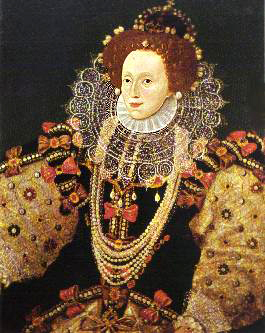Elizabeth I
 From Conservapedia
From Conservapedia Monarch[edit]
In 1558 Queen Elizabeth I took the throne and became one of many noteworthy monarchs of England. After almost forty five years of ruling she died in 1603, the ruler of one of the most powerful and influential nations of that age. Queen Elizabeth I was able to skilfully manage and keep peace between the Parliament and deal with the religious tension still present in England between Catholics and the still relatively new Anglican Protestantism. In 1588 she also triumphed over the massive Spanish Armada that made an effort to invade England, a victory that was in large part due to her famous admirals, Sir Walter Raleigh and Charles Howard. At that time Spain was the most powerful nation in Europe. The loss of the Spanish Armada was the beginning of a fairly rapid loss of their top nation status. The period of Queen Elizabeth's successful rule is called the Elizabethan Age.
For many centuries England had been considered a European backwater, situated on a remote and cold island. But this very fact now made England powerful. Freed from any European entanglement by repudiating the Pope, England turned its back on mainland Europe and looked to the world, a process started during the reign of Elizabeth I. England prominently joined the Age of Exploration. Over the following 200 years, by sending ships and people across the globe, England founded many countries that are very important today: the USA, Canada, and Australia, to name just three.
| ||||||||
Categories: [Anglicans] [English History]
↧ Download as ZWI file | Last modified: 02/15/2023 20:09:35 | 30 views
☰ Source: https://www.conservapedia.com/Elizabeth_I | License: CC BY-SA 3.0
 ZWI signed:
ZWI signed:
 KSF
KSF